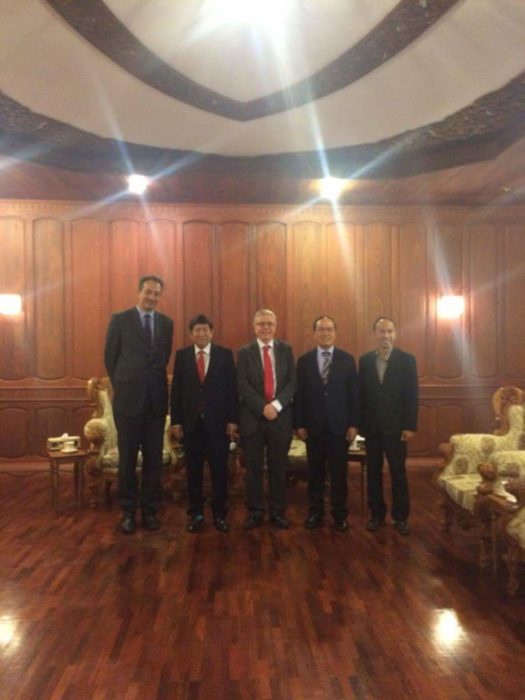20th December 2016 Vientiane, Laos
The Lao National Assembly – recent developments and scope for UK support
Britain’s most famous constitutionalist, Walter Bagehot, once described Parliament as “nothing less than a big meeting of more or less idle people.” His wry comment may have contained a grain of truth about the aristocrats who dominated Britain’s 19thC chamber. But it wouldn’t be a fair depiction of today’s National Assembly (NA) in Laos.
Its 149 MPs, elected in March, have recently concluded a busy and productive session. In four weeks, they passed 14 laws – including defining the powers of the NA and enshrining executive accountability to parliament. They debated reports from ministries and other agencies and raised a host of constituency concerns.
But it’s not just what they did which was important. It’s also what they said. 70% of MPs are new and almost all from the ruling party. Even so, they eagerly asserted their rights to probe and to question – as Ministers and others discovered. Prime Minister Thongloun Sisoulith himself attended the NA three times.
Indeed, the PM’s opening speech – laying bare the country’s challenges and reaffirming his fight against corruption and crime – set the tone for debate. MPs scrutinised the government’s economic performance, expressed concern about a mounting deficit, and demanded improved revenue collection. They also jumped on an audit report identifying 51 projects that violated investment rules and criticised land “concessions” awarded at the expense of local communities.
All of this took place amid unprecedented media coverage, with proceedings broadcast live. Afterwards, most observers seemed to agree that the NA – only around 30 years old in its current form – is now an institution flexing its muscles.
It’s why I am happy we decided to make support to parliament a priority under our Embassy’s Creative Partnership. With funding of around £100,000, the Westminster Foundation for Democracy (WFD) has embarked on a two-year project with the NA – initially to help the newly created Justice Committee develop an ombudsman function.
I hope we’ll broaden further our support in future. But, initially, I wasn’t sure we’d get very far. WFD – as the name suggests – supports multi-party systems. Could we persuade them to engage with Laos? My introductory call last year on Mrs Pany Yathoutou, the impressive NA President (Speaker), convinced me to try. Mrs Pany stressed her mission was to develop the NA’s law-making, oversight and review capabilities. And it didn’t take me long to realise other leaders – including the current PM – shared her constitutional vision of the NA becoming “the country’s leading political institution.” During our meeting, Mrs Pany urged me, as the representative of a country with a distinguished parliamentary tradition, to secure British expertise for the NA. This would complement the support it was receiving from the EU, Switzerland, Germany, UNDP and others.
So, I was delighted when WFD agreed to send a scoping mission in March this year under eminent parliamentarian Lord Andrew Stunnell. Since then WFD has opened an office here – its first in a communist state (!) – and its CEO, Anthony Smith, paid a call on the NA in October.

It took centuries for Britain’s Westminster to become – in the famous but misquoted words of John Bright – “the mother of parliaments” and the bedrock of our political system. The Lao NA is evolving rapidly and its continued progress will be also critical to this country’s long term development. It’s why I believe that continued UK support should be part of its future.
This report brought back memories of when I was Junior Attaché and Vice Consul at the British Embassy in Vientiane in 1956/7 and Laos was still a Kingdom. The then Ambassador, Gilbert Holliday, had to attend the opening of the National Assembly and found that the Embassy car, a Humber Hawk, had broken down, and for some reason our driver had decided to work on our Land Rover’s engine and there was not time to reassemble the parts. H.E. thought we should ask the Americans for a lift, but this struck me as infra dig and I suggested we use my decrepit second/third-hand Austin 12, at which he shuddered but consented. After dusting the back seat, because of his white uniform, I drove him to the Assembly and he asked me not to stop at the main entrance, but some yards before. Unfortunately my brakes were not very good and we landed at the main door, much to his chagrin, but at least he arrived in a British car!